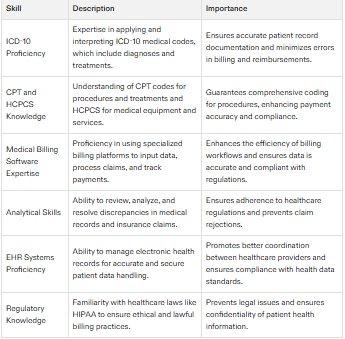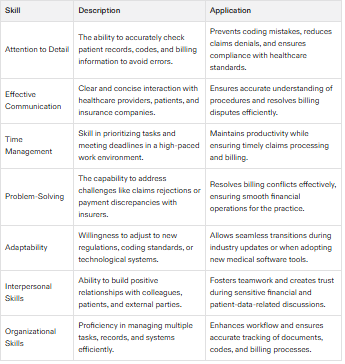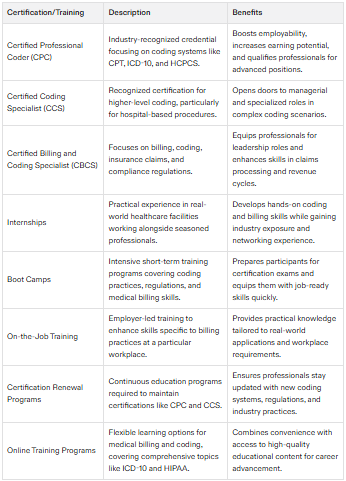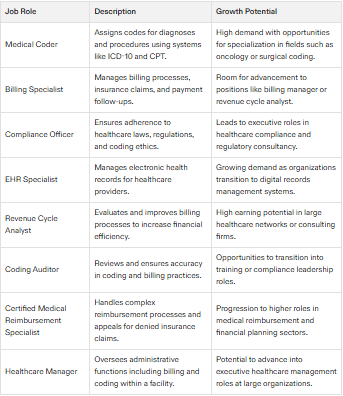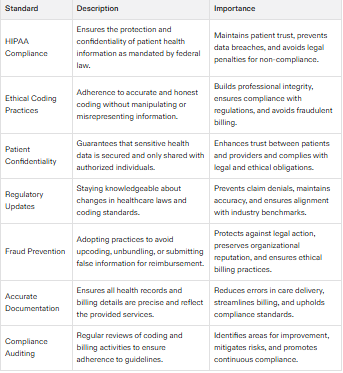Medical Billing And Coding Skills
Top Medical Billing and Coding Skills You Must Have
To excel in medical billing and coding, it’s essential to have a strong grasp of specific hard and soft skills. From mastering coding systems to effective communication, these skills ensure accurate billing and compliance with healthcare regulations. This article will guide you through the key medical billing and coding skills you need to succeed.
Key Takeaways
Proficiency in ICD-10, CPT, and HCPCS coding is essential for accurate medical billing, ensuring comprehensive documentation and minimizing financial discrepancies.
Soft skills such as attention to detail, effective communication, time management, and adaptability are crucial for enhancing the efficiency of medical billing and coding professionals.
Certification and ongoing education, including CPC and CCS, significantly bolster career prospects, while practical experiences like internships and boot camps provide valuable real-world skills.
Essential Hard Skills for Medical Billing and Coding
Acquiring the essential hard skills in medical billing and coding is crucial for maintaining precise billing practices and upholding the integrity of patient records. These specific abilities enable those specializing in medical billing to adeptly work with intricate coding systems, operate specialized software effectively, and adhere strictly to healthcare regulations.
Crucially included among these key hard skills are analytical skills, which are necessary for analyzing medical records and insurance claims to identify errors, discrepancies, and ensure compliance with regulations.
ICD-10 Proficiency
Interpreting and applying medical codes, including ICD-10 codes, is key for accurate medical billing and coding. The ICD-10 includes approximately 68,000 codes. Familiarity with common ones, like Z34.90 for pregnancy and Z48.0 for surgical dressings, and the ability to look up less common codes accurately ensures proper billing and meticulous patient records.
Errors in ICD-10 coding can result in billing discrepancies and financial loss. Minor mistakes in code selection may delay reimbursements and elevate stress for patients and healthcare providers. Attention to detail prevents these issues and ensures smooth billing processes.
CPT and HCPCS Codes Knowledge
It is essential for medical coders to have a strong command of both CPT (Current Procedural Terminology) and HCPCS (Healthcare Common Procedure Coding System) codes. The use of CPT codes is instrumental in recording the procedures and treatments patients receive, which works alongside ICD-10 codes to thoroughly capture a patient’s medical history as well as the services they’ve been provided.
HCPCS coding plays a pivotal role in processing claims for medical equipment, supplies, and additional healthcare services. Utilized collectively, these various coding systems are key to ensuring all-inclusive documentation and accurate billing related to patient care. Medical coders must be adept at employing these systems accurately so as to preserve precise records and uphold the integrity of medical coding practices.
Medical Billing Software Skills
Expertise in the use of medical billing software facilitates an efficient and precise billing process. Mastery of different systems is essential for effectively managing insurance claims, securing payments, and guaranteeing the precision of those claims.
The ability to adeptly maneuver within these medical billing platforms ensures that patient records are meticulously maintained while adhering strictly to healthcare regulations. Skillful handling of such software significantly enhances both accuracy and efficiency in practice.
Understanding EHR Systems
EHR systems have revolutionized the management of patient records. Gaining proficiency in these systems can lead to improved access and precision of patient information, minimizing clinical mistakes due to issues with handwritten documents.
Being adaptable and keeping pace with technological progress is crucial when working with various EHR platforms. Mastery of EHR technology ensures that patient health data is both protected and accurately logged, promoting effective interaction among healthcare providers as well as between medical professionals and billing divisions.
Crucial Soft Skills for Medical Billing and Coding
Soft skills significantly enhance the effectiveness and efficiency of medical billing and coding professionals. A medical biller, for instance, must manage various responsibilities such as time management, organization, communication, and problem-solving to ensure the smooth operation of the healthcare funding cycle. These skills improve communication, problem-solving, and overall productivity.
Here are some crucial soft skills to develop.
Attention to Detail
In the field of medical billing and coding, meticulousness is key. Ensuring accurate billing is fundamental to avoid mistakes that may lead to considerable distress, unnecessary extra work, financial inconsistencies, and squandering of resources.
Precisely pinpointing any irregularities in billing and coding averts expensive blunders. This accuracy safeguards the integrity of patient records while also ensuring adherence to healthcare regulations regarding coding accuracy.
Effective Communication Skills
It is crucial for medical billers and coders to practice clear and precise communication, as their role involves relaying complex information that could lead to confusion among patients and healthcare providers. This clarity supports collaborative efforts and the correct handling of claims as well as medical records.
By maintaining effective communication, any issues related to billing can be resolved swiftly, ensuring that all involved parties are kept abreast of relevant details and updates.
Time Management
Managing one’s time efficiently is essential for coping with workloads and enhancing productivity. By mastering effective time management, professionals are able to adhere to deadlines, maintain precision in their tasks, reduce mistakes, avoid professional burnout and secure success over the long haul.
In the realm of medical coding, being punctual is crucial as it facilitates prompt patient care delivery, seamless transfer of records and supports insurance pre-authorization processes.
Problem-Solving Abilities
Navigating the intricacies involved in medical billing requires strong problem-solving skills, especially when dealing with denied insurance claims or disputes over patient payments with an insurance company. It’s essential for professionals to adeptly manage sophisticated billing systems and effectively tackle such challenges.
The goal of problem solving within the context of medical billing is to devise strategies that are acceptable to everyone concerned, thereby guaranteeing streamlined billing operations and swift settlement of problems.
Adaptability
In the rapidly evolving domain of medical billing and coding, being adaptable is crucial. This flexibility enables specialists to effectively navigate modifications in healthcare regulations, technological advancements, and changes in coding guidelines.
This capability to adapt ensures that professionals remain abreast with contemporary industry benchmarks while sustaining effective processes for medical billing.
Certification and Training for Medical Billing and Coding
Credentials and educational programs establish proficiency, increase trustworthiness, and create new professional pathways for individuals specializing in medical billing and coding.
Outlined below are some principal training courses and certification options available within this sector.
Certified Professional Coder (CPC) Certification
Earning the Certified Professional Coder (CPC) certification from the American Academy of Professional Coders (AAPC) is considered a symbol of distinction in the field. Obtaining CPC certification can elevate one’s professional standing, expand employment prospects, and typically results in increased compensation.
To be awarded this prestigious credential, individuals must successfully complete an exhaustive examination that tests their knowledge of coding procedures, medical terminology, and adherence to regulatory standards. Employers tend to favor those with CPC certifications when hiring for jobs due to their demonstrated expertise, which can also lead them into more niche roles within the industry.
Certified Coding Specialist (CCS) Certification
Possessing the CCS certification signifies a mastery in coding skills, which is acknowledged as a mark of superior proficiency. This level of expertise often results in increased income and more stable employment for the certified individual.
Individuals with Certified Coding Specialist credentials are frequently sought after for elevated career paths, encompassing managerial roles and niche coding positions. Employers tend to favor these specialists, leading to improved prospects for job acquisition and progression within their careers.
Ongoing Education and Training
Medical coders must engage in ongoing education to stay abreast of the changing practices and rules, which bolsters their career progression and opens up greater prospects for advancement.
As a healthcare provider, it is imperative for professionals to keep track of changes in laws and regulations to maintain compliance. To elevate their careers and boost earning possibilities, obtaining Certifications is frequently necessary.
Practical Experience and Hands-On Training
Gaining hands-on experience is essential for professionals in medical billing and coding. Opportunities such as internships, boot camps, and on-the-job training are indispensable for putting theoretical knowledge into practice within real-life scenarios.
Consider the following options for practical training.
Internships and Externships
Gaining practical skills vital for a successful career in medical billing can be achieved through internships which provide indispensable hands-on experience. These opportunities, such as internships and externships, are critical for budding medical billers and coders to gain exposure to the real world setting.
These experiences are also integral in teaching compliance with healthcare regulations, including the importance of patient confidentiality enforced by HIPAA mandates. Such programs help interns not only develop their skills but also ensure adherence to crucial healthcare standards.
Boot Camps and Workshops
Boot camps designed for aspiring medical coders provide both expert knowledge and mentorship, concentrating on intensive instruction to prepare individuals with current coding practices suitable for direct entry into the workforce.
These programs frequently allow participants to engage with professionals in the field, thus offering valuable networking opportunities. By delivering a focused curriculum over a short period of time, these boot camps rapidly furnish attendees with critical coding skills necessary for their profession.
On-the-Job Training
Professionals in medical billing and coding gain practical skills and insights into the distinct workflow subtleties present in diverse healthcare environments through on-the-job training. This experience allows them to tailor their capabilities to meet the unique requirements of different healthcare settings.
Such training guarantees that those specializing in medical billing and coding can competently employ their expertise in actual situations encountered within the field.
Career Opportunities and Growth in Medical Billing and Coding
Numerous career opportunities and potential for growth are inherent in the field of medical billing and coding, which is marked by a high demand for professionals as well as various work environments.
Diverse Work Settings
Medical coders can work in various healthcare settings including hospitals, clinics, insurance companies, and remote positions. Hospitals employ coders to review patient records and assign appropriate codes for billing and reimbursement.
Physician’s offices rely on coders for processing coding across various medical specialties. Remote work opportunities have increased due to advancements in technology and electronic health records.
Job Market Demand
Ensuring the precision of patient records, billing operations, and adherence to healthcare regulations is a crucial responsibility that medical coders bear. The anticipated increase in employment opportunities for medical billers over the decade from 2020 to 2030 stands at 9 percent, with an expectation of around 34,000 job openings each year.
By the year 2032, it is estimated that there will be an 8 percent growth in positions for specialists in medical records. This underscores a strong need for professionals adept at medical billing and coding within the healthcare industry.
Career Advancement
Progressing in one’s career may entail taking on managerial responsibilities, delving into auditing careers, or honing skills in medical coding for particular healthcare sectors. Acquiring Credentials and gaining experience paves the way to more lucrative positions with specialization.
Securing certifications like CPC (Certified Professional Coder) and CCS (Certified Coding Specialist) can significantly boost job opportunities and make candidates eligible for executive roles. For sustained growth within their career trajectory, professionals must commit to ongoing education and remain abreast of evolving trends in the industry.
Compliance and Ethical Standards in Medical Billing and Coding
Maintaining integrity and adherence to regulatory standards is crucial in the realm of medical billing and coding. Medical billing and coding professionals play a vital role in ensuring efficient communication and record management among medical providers, which is essential for patient care and the overall functioning of healthcare services. This not only secures the robustness of the healthcare system, but also safeguards confidential patient data.
Essential elements of ethical conduct and compliance within this sector include:
HIPAA Compliance
Adhering to HIPAA guidelines is vital in securing patient health information within the healthcare sector. It’s imperative for medical billers, given their role, to uphold confidentiality and observe these regulations strictly. Such adherence fortifies the security of patient data and sustains trust between patients and healthcare providers.
Professionals specializing in medical billing and coding must vigilantly protect patient records while ensuring that their billing and coding methods are fully compliant with HIPAA norms. This careful compliance is key to preserving both the integrity of sensitive patient health information and its confidentiality.
Ethical Coding Practices
Ethics plays a pivotal role for medical coding professionals, safeguarding the privacy of delicate patient records and upholding confidentiality protocols. It is imperative that those involved in medical billing and coding maintain honesty while handling private patient information, committing to ethical principles.
In their line of work, medical coders might encounter ethical dilemmas involving choices about code assignment, practices related to billing or inconsistencies within documentation. Such situations require meticulous deliberation. Upholding integrity within the realms of medical billing and coding is fundamental for preserving confidence in the healthcare system and steering clear of any legal consequences.
Regulatory Updates
It is essential for medical billing and coding professionals to keep abreast of any regulatory changes or updates in healthcare legislation. To prevent claim rejections and uphold the accuracy of medical billing processes, it’s imperative that these individuals adhere strictly to established coding guidelines, regulations, and the stipulations put forth by payers.
Ensuring compliance with these directives plays a pivotal role in securing successful operations within the realm of medical billing and coding. By consistently staying current on modifications to laws and standards governing their industry, those who specialize in billing and coding are able to maintain conformity with industry benchmarks.
Summary
To excel in the field of medical billing and coding, individuals must cultivate a comprehensive skill set that includes both technical expertise and soft skills. This involves becoming proficient with various coding systems such as ICD-10, CPT, and HCPCS, as well as mastering the use of medical billing software and electronic health record (EHR) systems. In parallel to these hard skills, professionals should develop key soft skills including meticulous attention to detail, strong communication abilities, effective time management strategies, aptitude for problem-solving and flexibility.
Advancing one’s career trajectory in this sector is significantly bolstered by pursuing education and obtaining certifications like CPC (Certified Professional Coder) or CCS (Certified Coding Specialist). Gaining hands-on experience through diverse channels like internships or boot camps helps bridge the gap between academic learning and practical application within actual healthcare settings. Maintaining stringent adherence to ethical practices ensures compliance with regulations while safeguarding patient confidentiality—an essential component upholding the integrity of our healthcare system at large. The journey into a career encompassing medical billing and coding can be intensely rewarding but equally demanding—presenting abundant prospects for professional growth along with continual opportunities for progression within this dynamic industry.
Frequently Asked Questions
What are the essential hard skills required for medical billing and coding?
Expertise in ICD-10, CPT, and HCPCS coding systems is vital for anyone pursuing a career in medical billing and coding. To these skills, being adept at using medical billing software and electronic health records (EHR) systems is equally important.
Achieving proficiency in these areas is key to excelling within the realm of medical billing and coding.
Why is attention to detail important in medical billing and coding?
Attention to detail is crucial in medical billing and coding to avoid errors that can lead to financial discrepancies and increased administrative workload.
Ensuring accuracy helps maintain efficient operations and supports patient care.
How do certifications like CPC and CCS benefit medical billing and coding professionals?
Certifications such as CPC and CCS significantly enhance professional credibility, validate expertise, and increase job opportunities, ultimately leading to higher earning potential in the medical billing and coding field.
What role does practical experience play in medical billing and coding?
Gaining hands-on experience is fundamental in the realm of medical billing and coding, enabling practitioners to transfer theoretical understanding into practical scenarios while cultivating critical competencies. Participation in apprenticeships or practical workplace learning markedly improves expertise within this domain.
How do medical billing and coding professionals ensure compliance with HIPAA regulations?
Medical billing and coding professionals ensure compliance with HIPAA regulations by safeguarding patient health information and maintaining confidentiality.
Adhering to legal standards is essential to protect the integrity of patient records.

